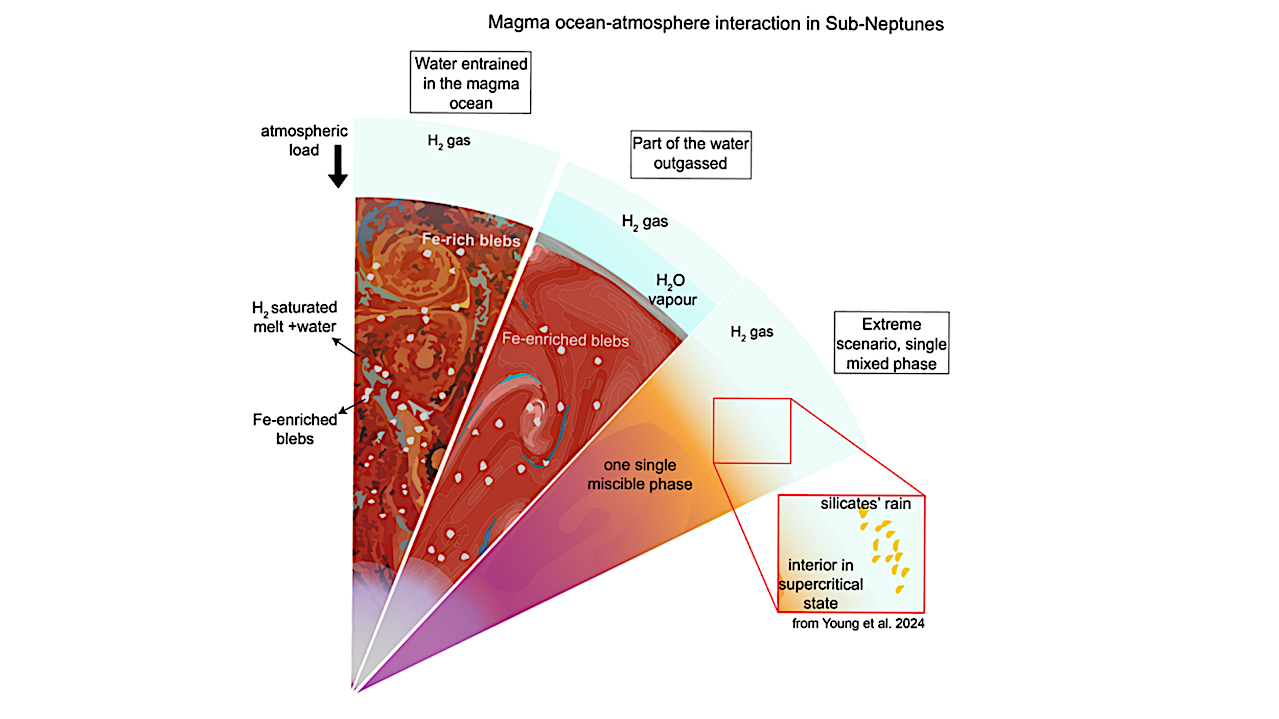Science
Experiments Uncover Water Generation During Planet Formation

Research has revealed that extreme water generation occurs during the formation of certain types of planets, a phenomenon not observed in our own Solar System. This discovery stems from experiments that explored how hydrogen in a planet’s atmosphere interacts with hot magma beneath the surface. The results indicate that this interaction can lead to significant water production, challenging existing models of planetary formation.
New Insights into Planetary Composition
The findings relate to a category of planets that have become increasingly abundant in the Galaxy but lack counterparts in our Solar System. These planets are characterized by a rocky core surrounded by a thick envelope dominated by hydrogen. According to models, the reaction between the atmospheric hydrogen and the underlying magma ocean can create substantial amounts of water, potentially altering our understanding of both planetary development and the conditions necessary for life.
Experiments conducted by researchers involved simulating the high-pressure environments found on these planets. By examining the interactions between hydrogen and molten rock, scientists observed the formation of water under conditions similar to those present during the early stages of planet formation. This work, published in the journal Astrobiology, emphasizes the importance of these processes in shaping planetary atmospheres and geologies.
Significance of Water in the Universe
Water is a critical component for life as we know it, and understanding its formation on distant planets broadens the scope of astrobiological research. The presence of water influences not only the potential habitability of a planet but also its geological features and atmospheric dynamics. The results of these experiments highlight that planets with hydrogen-rich envelopes could have environments suitable for sustaining liquid water, thus increasing the likelihood of life beyond Earth.
The implications of this research extend to our search for extraterrestrial life and the conditions necessary for its emergence. As techniques for detecting exoplanets improve, scientists may soon be able to identify worlds that exhibit the characteristics predicted by these new models.
In conclusion, the recent experiments shed light on the complex interactions that occur during planet formation, revealing that significant water generation is possible in environments previously considered inhospitable. This breakthrough enhances our understanding of the diversity of planetary systems and their potential to host life. As research advances, it may pave the way for future explorations of these intriguing worlds.
-

 Science3 weeks ago
Science3 weeks agoInterstellar Object 3I/ATLAS Emits Unique Metal Alloy, Says Scientist
-

 Science3 weeks ago
Science3 weeks agoResearchers Achieve Fastest Genome Sequencing in Under Four Hours
-

 Politics4 weeks ago
Politics4 weeks agoAfghan Refugee Detained by ICE After Asylum Hearing in New York
-

 Business3 weeks ago
Business3 weeks agoIconic Sand Dollar Social Club Listed for $3 Million in Folly Beach
-

 Health4 weeks ago
Health4 weeks agoPeptilogics Secures $78 Million to Combat Prosthetic Joint Infections
-

 Lifestyle4 weeks ago
Lifestyle4 weeks agoJump for Good: San Clemente Pier Fundraiser Allows Legal Leaps
-

 Business4 weeks ago
Business4 weeks agoMcEwen Inc. Secures Tartan Lake Gold Mine Through Acquisition
-

 Science4 weeks ago
Science4 weeks agoMars Observed: Detailed Imaging Reveals Dust Avalanche Dynamics
-

 Health4 weeks ago
Health4 weeks agoResearcher Uncovers Zika Virus Pathway to Placenta Using Nanotubes
-

 World4 weeks ago
World4 weeks agoUS Passport Ranks Drop Out of Top 10 for First Time Ever
-

 Entertainment4 weeks ago
Entertainment4 weeks agoJennifer Lopez Addresses A-Rod Split in Candid Interview
-

 Business4 weeks ago
Business4 weeks agoSan Jose High-Rise Faces Foreclosure Over $182.5 Million Loan









